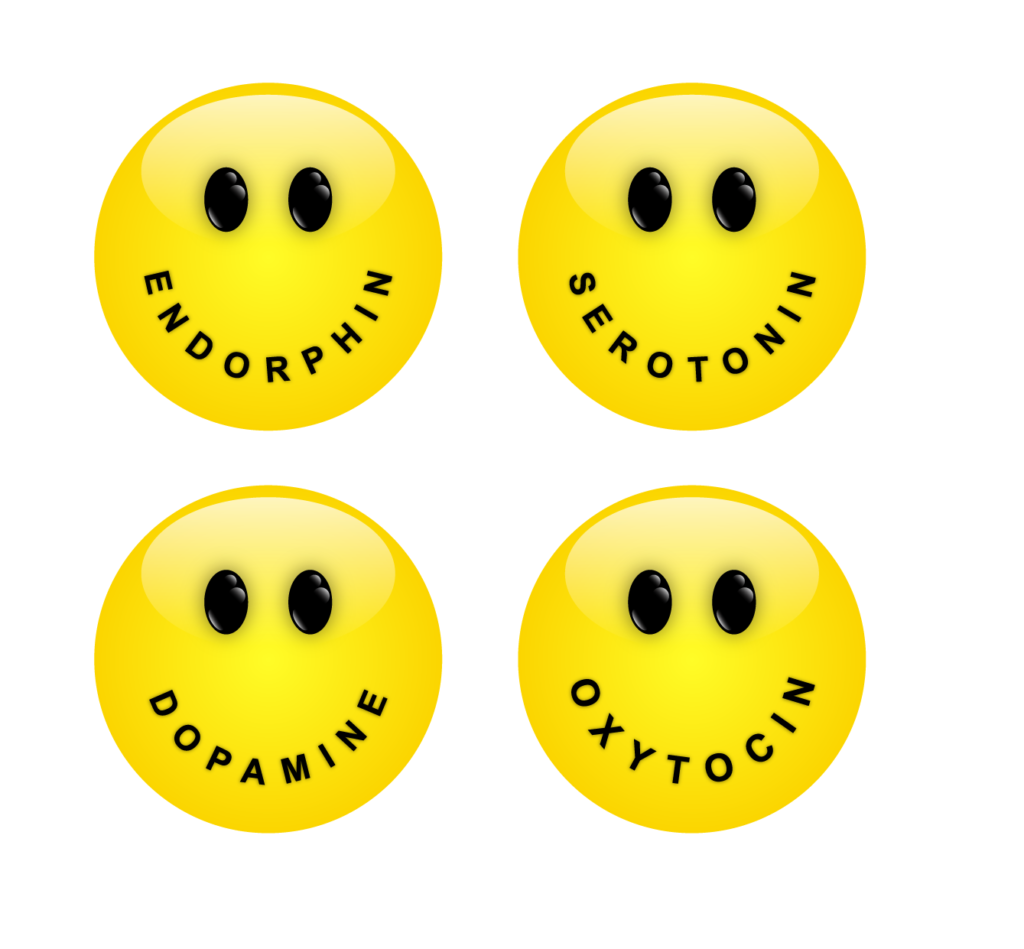As the chemical messengers flowing through your very bloodstream, the so-called ‘happy’ hormones play an instrumental role in activating bodily processes —think heat rate, sleep or digestion— and regulating your mood, with such positive outcomes as pain relief, bonding, the feelings of pleasure, trust, even happiness.
The famed happy hormones that promote general wellbeing are:
- Serotonin is a hormone and a neurotransmitter, meaning endogenous chemical substances that enable neurons to communicate with each other and with target tissues.
Known as the happy hormone of the gut, as that is where 90% is produced, it regulates mood, sleep, appetite, digestion, your learning ability and memory.
Gut bacteria and the ready availability of tryptophan, an essential amino acid that acts as serotonin’s precursor, influence the production of this feel-good hormone. Food is key here, since essential amino acids are delivered only through your diet, while the good gut bacteria are activated and maintained by a healthy, fiber-rich intake of plant foods, with meat and fat also necessary, but in moderation. Refined carbohydrates and fast food, so typical of Western diet, are enemies, logically. This will come as no surprise: the practice of sports and/or the maintenance of an ongoing fitness program, as part of your daily-weekly to-do’s, will enhance tryptophan and serotonin levels.
- Dopamine is also a hormone and neurotransmitter produced mainly in the gut (up to 50%) that plays a key role in your brain’s reward system.
Known as the motivational molecule that keeps you alert and proactive, it is not only linked to pleasurable sensations. It plays a pivotal role in learning, memory and attention (cognitive functions), your motor system, decision making, impulse control, and maternal and reproductive behaviors.
Essential to dopamine, but also true of all these happy hormones, is the continued and close care of the gut microbiome. This has been slowly revealed by continued research into Alzheimer’s and other neurodegenerative diseases and conditions, which have established that an unhealthy microbiome will ultimately affect the area of the brain where dopamine-dependent neurons reside.
- Endorphins
are also known as the runner’s hormone, because they are responsible for the runner’s high, a gust of euphoria when these ‘little guys’ come rushing in, and for that feel good mood and positive disposition you take back home after you finish exercising. They are your body’s organic painkiller.
They act indirectly when your body produces them to address stress or discomfort by inhibiting the neural transmission of pain in the nervous system. Famously, they bind to your body’s opioid receptors and act as a sort of natural morphine. Not only tied to fitness and working out routines, endorphin levels also increase when you engage in reward-producing activities, most notably eating and having sex.
- Oxytocin has been tagged the love hormone by some and the cuddle hormone by others.
It activates bonding, generosity and trust, and is particularly active during childbirth (stimulating contractions), breastfeeding, and the crucially needed parent-child bond. The hormone is secreted in response to touch (you know, a caress, kissing, cuddling, sex) or the right kind of eye contact, counterbalancing the negative effects of cortisol.
While initially found to enhance trust, empathy, responsiveness or gratitude in couples (heck, it is believed by some to be the active romantic ingredient that makes relationships work long-term), later-year studies have revealed that it also plays a central role in regulating the immune system, wound healing, muscle health, and pain perception.
Here’s a list of stuff that will exacerbate these natural mood-boosters.
- Get outside and get sunlight
- Incorporate exercise seamlessly
- Laugh frequently
- Give supplements a chance
- Let music and meditation inspire you
- Get a good-night’s sleep
- Get a massage and manage stress actively
- Plan romantic activities
- Eat right or better, for example by learning to cook at home
Sources:
https://www.healthline.com/health/happy-hormone#sunlight
https://atlasbiomed.com/blog/serotonin-and-other-happy-molecules-made-by-gut-bacteria


